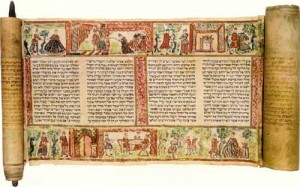
We often look at Purim as a day of inversion and celebration: we wear masks and don costumes, make noise at Haman’s name, and eat a festive meal with family and friends. But Purim’s meaning goes far deeper than the surface and it is hardly about just masquerading and reveling; everything from the narrative of Megillat Esther to the mitzvot (commandments) of the day directs us to rout out oppression and refuse to let injustice reign in the world. We are guided by the personal examples of Mordechai and Esther and by the timeless values of the Jewish story to build better lives for ourselves and for all in the world.
This is the transcendent experience at the heart of the holiday of Purim: faced with the conniving Haman and his plan to ascend to a role of power and terror and inflict genocide on the Jewish people, Mordechai and Esther risk their lives to insist that the world be rid of this injustice, and they do so in a story that unfolds, curiously, without mention of God. While the Sages agree that God’s presence is behind the fortuitous events bringing redemption to the good and punishment to the wicked, the text itself ascribes nothing to the Divine.
I read God’s perceived absence as an invitation to action. Though we are always charged with responsibility to be partners with the Divine in stewardship of the world, paradoxically, this call to act is loudest when we cannot hear it. When injustice proliferates in the world, when people suffer, it’s not that God is absent; it’s that God is inviting us to step up and partner in repairing the injustice.
Today, injustice against the poor and marginalized is proliferating around the world. But that means that our invitation, too, is everywhere. Never has the challenge been greater, and never has the guiding light of the Jewish people been more essential for a world afflicted with darkness. This is the profound lesson of the Megillah and our charge as Jews: taking into our own hands the word and work of God to build a better world.
Our challenge is to have the courage to act, using the story of Purim as our inspiration. Mordechai and Esther did not shy away from their responsibilities or shut themselves off from society; instead, they seized the moment and engaged the world, perpetuating the story of the Jewish people and telling it in the loudest and most inspiring way. We can learn so much from Mordechai’s penetrating question to Esther: “Who knows whether you have come to your position for such a time as this?” (4:14). We must see that positions of power and privilege are not ends in themselves but means to help others; we must imitate Esther and use our resources to do good, inspiring and enriching the lives of others.
This lesson of social and global responsibility, of concern for others, is present in so much of the celebration of Purim, as we send packages of food to our friends and give gifts to those less fortunate than us. The responsibility for attending to issues like poverty, hunger and social justice is a value shared by Yeshiva University and American Jewish World Service. We believe that helping individuals and communities, wherever they may be, and striving to recognize that God’s hiddenness is an invitation to action, is a deep expression of Divine values.
And, of course, we read the Megillah aloud and as part of a community; all must hear its story and be inspired to build a better world. This is the same message inherent in so much of the service learning that AJWS and Yeshiva University both do: there is not only something to be shared with others but something to be learned for oneself. We cannot do this work alone. It takes each one of us, working both individually and together, in partnership with God, to create a world that is consistent with the timeless values of our tradition and the sacred vision of Torah.
A guiding principle for the world we strive to create is the verse from our Aleinu prayer: “L’taken olam b’malchut Shadai—to perfect the world under the reign of the Almighty.” We must remember that putting the imprint of God on the world is in part our task.
| Richard M. Joel is the fourth president of Yeshiva University and Bravmann Family University Professor. Dedicated to ennobling and enabling a generation leaders in and beyond the Jewish community, Joel has catalyzed a renewed focus on academic excellence, enriched student life and broadened service to the Jewish and wider communities. Prior to this role, he served as president and international director of Hillel: The Foundation for Jewish Campus Life, where he was the driving force behind a renaissance of Jewish life at American universities, building numerous new facilities, partnering in the creation of Birthright, and focusing the Hillel community on reaching Jewish youth through engagement and empowerment. |
AJWS is committed to a pluralistic view of Judaism and honors the broadest spectrum of interpretation of our texts and traditions. The statements made and views expressed in this commentary are solely the responsibility of the author.
AJWS’s work in countries and communities changes over time, responding to the evolving needs of partner organizations and the people they serve. To learn where AJWS is supporting activists and social justice movements today, please see Where We Work.

